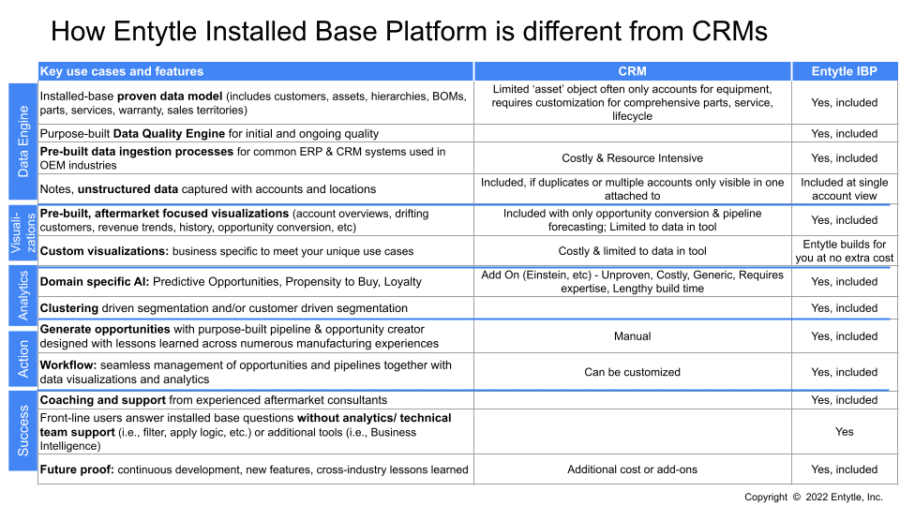A common theme across most OEM sales teams is they are not properly equipped with the necessary tools to maximize customer interactions. Sales teams are tasked to navigate through several layers of data across multiple systems containing inconsistent data to construct a story about their customers. This occurs across all types of sales that are connected to the installed base: parts sales, services, upgrades, new equipment, inbound and outbound sales teams, etc.
How do most OEMs try to solve this challenge? By implementing a generic CRM solution and then trying to configure that to their specific industry and use cases, resulting in a less than full-scale solution!
Yes, CRMs do have a place with OEMs to help track customer conversations, opportunities, and meetings, but they were not purpose-built for OEMs to meet their demanding customer needs.
CRM use cases and features are limited to the amount of information that can be accessed by stakeholders.
Often this type of information will only help customer-facing teams to interact at a high level with the customer, leaving out details such as what is actually installed at a customer site, as well other key use cases.
Other key use cases a CRM is not equipped to handle (without costly customization or other tools connected to it):
- An Industrial Data quality engine to clean and unify installed base data from OEMs’ tech stack
- A proven data model for a 360 view of the installed base (includes BOMs, parts, services, warranties, and service contracts)
- Purpose-built analytics for OEMs (predictive opportunities, customer loyalty, propensity to buy, wallet share, etc.)
- Coaching and support from experienced aftermarket consultants
- See Exhibit A for a full list
There still is the problem of legacy systems that sales teams must use in addition to their CRM which are cumbersome and inefficient. Some types of analysis or consolidation can be created through a data lake to draw a better understanding of the customers. This requires access to the right data, an analyst who understands the nuances of different data silos, and the expertise to join tables together and account for data quality issues – which could take several weeks to perform a ‘simple’ analysis.
By leveraging an Installed Base Platform (IBP), OEMs can solve use cases that their CRM’s limited functionality cannot or would require extensive customization and costs. (see Exhibit A).
An Installed Base Platform is an off-the-shelf solution, purpose-built for Industrial OEMs to provide clean installed base visibility, unifying OEMs data from multiple data sources into one single source of truth with proven algorithms to automate opportunities to efficiently target their customers and drive new aftermarket revenue.
Several use cases that CRMs do not address are standard use cases and features included in Entytle’s Installed Base Platform, including the support from aftermarket experts to coach OEMs’ commercial teams and drive success.
Sales teams can now increase their productivity by knowing what to sell, when to sell, and to which customers. This is enabled through an increased understanding of their installed base with purpose-built algorithms for OEMs to gain deeper insights, including propensity to buy, customer loyalty, drift, and wallet share. As well, automated prospecting opportunities can be created for parts predictions and recommendations for specific customer locations.
Sales teams also have access to this data either through the Installed Base Platform or can have it integrated back into their CRM to track and drive accountability on leads and opportunities. Within the Installed Base Platform, salespeople have a 360 view of accounts to see a comprehensive view of equipment, parts, services, contracts, and contacts. This data can also be taken to create targeted hunting lists based on historical purchases across their entire territory.
In conclusion, CRMs have their place at an OEM, but the limitations of being generic platforms have led market leaders to leverage an Installed Base Platform to unify customer data, uncover insights and leverage a single source of truth to drive proactive sales and customer engagement efficiently.
Exhibit A









